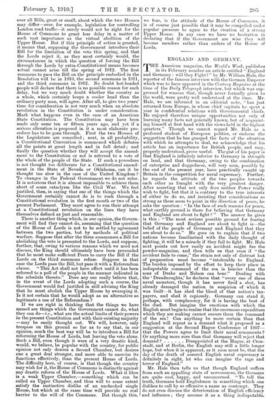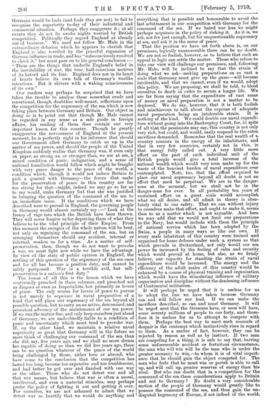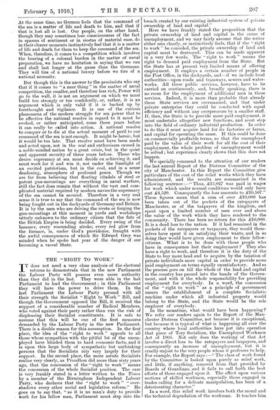ENGLAND AND GERMANY. T HE American magazine, the World's Work, pnblishes
in its February number an article entitled "England and Germany : will they Fight?" by Mr. William Hale, the reporter of the famous interview with the German Emperor which was to have appeared in the Century Magazine at the time of the Daily Telegraph interview, but which was sup- pressed for reasons that, though never formally given to the world, were pretty well understood at the time. Mr. Hale, we are informed in an editorial note, "has just returned from Europe, in whose chief capitals lie spent a. year in confidential relations with Governmental chiefs. He enjoyed therefore unique opportunities not only of learning many facts not generally known, but of acquaint- ing himself at first hand with the views held in the highest quarters." Though we cannot regard Mr. Hale as a profound student of European politics, or endorse the suggestion that he has grasped the facts of the situation with which he attempts to deal,. we acknowledge that his article has an importance for British people, and may, properly understood, prove useful. The gist of his paper is that England is infinitely inferior to Germany in strength on land, and that Germany, owing to the combination of enterprise and doggedness, will very soon, possibly by the end of the present year, have practically caught up Britain in the competition for naval supremacy. Further, he regards the attitude of the two peoples towards each other as fraught with the very greatest danger. After asserting that not only does neither Power really wish to fight, but that it is contrary to the true interests of either to do so, and insisting that considerations so strong as these seem to point in the direction of peace, he asks the question : "In the face of such reasons for peace, what earthly ground is there for believing that Germany and England are about to fight ? " The answer he gives is this : "The most serious possible ground for fearing that Germany and England are about to fight is—the belief of the people of Germany and England that they are about to do so." He goes on to explain that if two nations become familiarised with the daily thought of fighting, it will be a miracle if they fail to fight. Mr. Hale next points out how easily an accident might fire the powder-magazine, and then tells us that even if "the accident fails to come," the strain not only of distrust but of preparation must become "intolerable to England. The burden imposed by the effort to keep their place in indisputable command of the sea is heavier than the sons of Drake and Nelson can bear." Dealing with the Dreadnoughts,' he declares that "every one of these naval monsters, though it has never fired a shot, has already damaged the nation in suspicion of which it was built—it has shed the blood of that nation's tax- payers, and shed it copiously. Germany can stand it, perhaps, with complacency, for it is having the best of the duel. But imagine the emotions with which the English must begin to realise that the enormous expenditure which they are making cannot ensure them the command of the sea! Can anything he more certain than that England will repeat as a demand what it proposed as a suggestion at the Second Hague Conference of 1907— that the Powers agree to limit their naval armaments ? Or anything more sure than that Germany will reject that demand ? Disappointed at the Hague, at Cron- stadt, and at Berlin, the English may still a little longer hope, but when it is apparent, as it soon must he, that the day of the death of assured English naval supremacy is definitely in sight, let who can imagine the rage and terror of England." Mr. Hale then tells us that though England suffers from such an appalling state of nervousness, the Germans are quite cool, happy, and unconcerned. "To tell the truth, Germans hold Englishmen in something which one dislikes to call by so offensive a name as contempt. They do not even discuss the deterioration of English efficiency and influence ; they assume it as a thing indisputable. Germans would be fools (and fools they are not) to fail to recognise the superiority to-day of their industrial and commercial situation. Perhaps they exaggerate it ; at all events they do not lie awake nights worried by British competition. Politically they regard England as already Out of business." We need not follow Mr. Hale in the extraordinary delusion which he appears to cherish that England is also terrified by the peaceful expansion of German influence in trade, and has "subconsciously resolved to check it," but must pass on to his general conclusion :— " These are the things that underlie England's belief in the inevitability of war, the true, half-conscious motives of its hatred and its fear. England does not in its heart of hearts believe its own talk of Germany's warlike intentions. But it shivers with a waking consciousness of its own."
Our readers may perhaps be surprised that we have taken the trouble to analyse these somewhat crude and sensational, though doubtless well-meant, reflections upon the competition for the supremacy of the sea which is now taking place between Germany and Britain. Our object in doing so is to point out that though Mr. Hale cannot be regarded in any sense as a safe guide in foreign affairs, his reading of them does contain one very important lesson for this country. Though he greatly exaggerates the nervousness of England at the present moment, he is perfectly right in his inference that should our Government allow Germany to catch us up in the matter of sea power, and should the people of the United Kingdom suddenly realise that Germany was, if even only on paper, as strong as, or stronger than, we are at sea, a mixed condition of panic, indignation, and a sense of national humiliation would follow which might be fraught with very grave danger to the peace of the world, a condition which, though it would not induce Britain to pick a quarrel with Germany—the forces that make for the preservation of peace in this country are far too strong for that—might, indeed we may go so far as to say would, make Germany feel that she was justified in bringing the question of the command of the sea to an immediate issue. If the conditions which we have described were to prevail in England, the governing people in Germany would almost certainly say :—" Look at the frenzy of rage into which the British have been thrown. They will never forgive us for depriving them of what they believe to be the vital principle of their Empire. From this moment the energies of the whole nation will be bent, not only on regaining the command of the sea, but on revenging themselves should any accident, internal or external, weaken us for a time. As a matter of self- preservation, then, though we do not want to provoke a war, we must fight now while we have the advantage. In view of the state of public opinion in England, the settling of this question of the supremacy of the sea once and for all has become a positive duty, and cannot be safely postponed. War is a terrible evil, but self- preservation is a nation's first duty."
The lesson of all this is the lesson which we have continually preached in these columns, and preached not as Jingoes or even as Imperialists, but primarily as lovers of peace. The only course for lovers of peace to pursue is not merely to acquiesce in naval preparation of a kind that will place our supremacy of the sea beyond all possible question, but to carry on an active, determined, and persistent advocacy of the maintenance of our sea power. If we run the matter fine, and only keep ourselves just ahead of Germany, we are undoubtedly liable to a condition of panic and uncertainty which must tend to provoke *war. If, on the other hand, we maintain a relative naval superiority so great that Germany will in the future no more think of challenging our command of the sea than she did, say, five years ago, and we shall no more dream her capable of doing so than we did five years ago, there can be no question whatever of the peace of the world being challenged by those, either here or abroad, who have come to the conclusion that the competition has lasted too long, become too expensive and too troublesome, and had better be got over and finished with one way or the other. Those who do not detest war and all 'that war means, but believe that war is often a moral, intellectual, and even a material stimulus, may perhaps prefer the policy of fighting it out and getting it over. For ourselves, we are not ashamed to admit that we detest war so heartily that we would do anything and everything that is possible and honourable to avoid the last arbitrament in our competition with Germany for the command of the sea. If we hated war less we might perhaps acquiesce in the policy of risking it. As it is, we ask, not for just enough, but for unquestionable supremacy at sea, and ask it in the name of peace.
That the position we have set forth above is, on our premisses, logically unanswerable there can be no doubt. We are not so foolish, however, as to believe that such an appeal to logic can settle the matter. Those who refuse to take our view will challenge our premisses, and, following Mr. Hale, will be inclined to say that the strain of doing what we ask—making preparations on so vast a scale that Germany must give up the game—will become intolerable, and that we cannot, even if we would, adopt this policy. We are proposing, we shall be told, to bleed ourselves to death in order to secure a longer life. We are far from saying that the expenditure of vast sums of money on naval preparation is not a matter to be deplored. We do say, however, that it is both foolish and mischievous to talk about the expense of adequate naval preparation being an intolerable strain. It is nothing of the kind. We could double our naval expendi- ture without going into the Bankruptcy Court, for, in spite of all that the pessimists may say, this country is not only very rich, but could, and would, easily respond to the extra sacrifices demanded. Remember that the real wealth of a country consists in the energy of its inhabitants, and that in very few countries, certainly not in this, is that energy fully called out. A very little more effort on the part of each individual unit of the British people would give a total increase of the national wealth which would very soon make up for the waste of the heaviest burden of naval expenditure ever contemplated. Note, too, that the effort required to place our naval supremacy beyond all doubt is not an effort that need be perpetual. We are in the danger- zone at the moment, but we shall not be in the danger-zone for ever. In all probability ten years of sustained effort on a great scale would accomplish what we all desire, and all admit in theory is abso- lutely vital to our safety. That we can without injury to ourselves make that effort, and ought to make it, seems then to us a matter which is not arguable. And here we may add that we -would not limit our preparations to the Navy, but would include with them the principle of national service which has been adopted by the Swiss, a, people in many ways so like our own. If every male inhabitant of this country were trained and organised for home defence under such a system as that which prevails in Switzerland, not only would our sea power be increased by the feeling of calm and security which would prevail at home, but also, as we firmly believe, our capacity for standing the strain of naval expenditure would be increased. The energy and the efficiency of the adult males of this country would be enhanced by a course of physical training and organisation which would have the stimulating influence of military organisation and discipline without the deadening influence of Continental militarism.
It will perhaps be urged that it is useless for us to adopt the line we have taken because Germany can and will follow our lead. If we can make the sacrifices described, so can and must Germany. It will be urged next that the Germans have, or soon will have, some seventy millions of people to our forty, and there- fore it is useless for us to attempt to compete with them. Perhaps the best way to meet• such counsels of despair is the contempt which instinctively rises in regard to them. As a matter of fact, however, they can be rejected by reason as well as by instinct. If two men are competing for a thing, it is safe to say that, barring some unforeseeable accident or fortuitous circumstance, the man who will win will be the man who is under the greater necessity to win,—to whom it is of vital import- ance that he should gain the object competed for. The man who feels that he must win or perish is able to call up, and will call up, greater reserves of energy than his rival. But who can doubt that in a competition for the command of the sea these considerations apply to Britain and not to Germany ? No doubt a very considerable section of the people of Germany would greatly like to possess the command of the sea, and thus gain the un- disputed hegemony of Europe, if not indeed. of the world. At the same time, no German feels that the command of the sea is a matter of life and death to him, and that if that is Jost all is lost. Our people, on the other hand, though they may sometimes lose consciousness of the fact in spasms of sentiment or in siestas of material ease, do in their clearer moments instinctively feel that it is a matter of life and death for them to keep the command of the sea. When, therefore, it comes to a competition which involves the bearing of a colossal burden in the matter of naval preparation, we have no hesitation in saying that we can and shall last longer at the game than the Germans. They will tire of a national luxury before we tire of a national necessity.
But though this is the answer to the pessimists who say that if it comes to "a near thing" in the matter of naval competition, the smaller, and therefore less rich, Power will go to the wall, it is not an argument on which we must build too strongly or too confidently, or, rather, it is an argument which is only valid if it is backed up by forethought and vigilance. It is one of the curious phenomena of the modern struggle for sea power that to be effective the national resolve in regard to it must be evoked, or rather anticipated, some three years before it can really be called into action. A national resolve to conquer or to die at the actual moment of peril to our command of the sea is not enough. It might be heroic, but it would be too late. That resolve must have been made and acted upon, not in the zeal and enthusiasm caused in a noble-minded nation by a great crisis, but in the quiet and apparent security of three years before. Those who ,desire supremacy at sea must decide on achieving it, and must work for it and win it, not under the limelight of an excited patriotism, but in the cool, and in a sense deadening, atmosphere of profound peace. Though we are far from believing that floating citadels of steel or patent gun-mountings are everything in naval warfare, still the fact does remain that without the vast and com- plicated material required by modern navies the supremacy of the sea cannot be secured. Therefore in a very real sense it is true to say that the command of the sea is now being fought out in the dockyards of Germany and Britain. It is by the men who are driving the rivets or forging the gun-mountings at this moment in yards and workshops utterly unknown to the ordinary citizen that the fate of the British Empire is being decided. Every swing of the hammer, every resounding stroke, every red glow from the furnace, is, under God's providence, fraught with the awful consequences of which Sir Edward Grey was minded when he spoke last year of the danger of our becoming a vassal State.












































 Previous page
Previous page